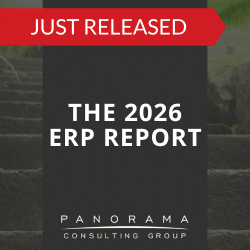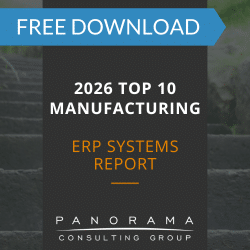- AI-ready data is accurate, consistent, and accessible across all business systems, ensuring reliable insights and decision-making.
- Disconnected ERP and legacy systems create data silos that limit AI effectiveness and lead to conflicting business insights.
- Clear data governance policies minimize security risks and errors in AI-driven processes.
- Scalable data infrastructure supports AI expansion as business needs evolve.
While many businesses assume they can plug AI into their existing systems and gain immediate insights, the reality is far more complex.
Data readiness is the foundation of AI success, and companies that fail in preparing business data for AI will find that their investments produce unreliable results. This leads to faulty predictions, financial miscalculations, and automation failures.
Before committing to AI-driven automation, predictive analytics, or machine learning, business leaders must ask a critical question: Is our data AI-ready?
AI-ready data is structured, trustworthy, and accessible. Today, we’re exploring what this means, and how to prepare your business data for AI-powered ERP systems.
2026 Clash of the Titans
SAP, Oracle, Microsoft, and Infor each have a variety of systems that can support data-driven decision-making. We surveyed customers of these four vendors to find out what their selection and implementation process was like.
Checklist for AI-Ready Data
1. Is Your Data Accurate, Consistent, and Unified Across the Business?
AI requires a unified, consistent dataset, but many organizations operate with multiple, disconnected systems that contain overlapping but inconsistent data. When critical information is spread across different databases, ERP modules, and legacy platforms, the algorithms learn conflicting or partial truths.
Many businesses assume their data is clean, but once AI models begin processing it, they quickly discover errors. A clear sign of data inaccuracies is when teams in different departments report conflicting numbers for the same metric.
For example, if sales, finance, and operations all have different revenue figures, AI certainly won’t be able to reconcile them, and the system may recommend misaligned budgeting strategies or misguided cost-cutting measures.
Similarly, conflicting supplier information in supply chain management systems can lead AI-powered procurement tools to recommend purchases from vendors that no longer exist or pricing strategies based on old market conditions.
Expert Insight
Ensuring data quality in AI systems requires company-wide standardization of key metrics, integration of business systems, and regular data audits. This attention to detail can enable your team to make faster, data-driven decisions with confidence and reduce financial risk.
2. Is Your Business Data Structured for AI to Process it Effectively?
AI thrives on structured, well-organized data, but many businesses store critical information in unstructured formats—scattered across spreadsheets or buried in handwritten notes and PDF reports.
AI cannot process disorganized, inconsistent data effectively. Attempting to train models on unstructured chaos can lead to issues such as:
- Inaccurate financial reporting, as key figures remain siloed in scanned documents or emails that AI cannot interpret.
- Unreliable customer analysis, when AI struggles to process free-text survey responses without structured labels.
If your employees are manually extracting information from multiple sources or converting files into different formats just to generate a report, then AI will face challenges, too—at a much larger scale.
Our ERP business consultants always tell clients to ensure that their business data is standardized, properly categorized, and stored in machine-readable formats. This enables AI-driven ERP software to deliver accurate insights, while accelerating decision-making.
3. Are Your Data Governance Policies Clear and Enforceable?
If your company lacks clear data management policies and controls, then employees will struggle to follow best practices for inputting, updating, and securing data. This not only produces low-quality data and unreliable insights but can also foment regulatory violations and security breaches.
For example, if your ERP system lacks strict role-based access controls, employees may unknowingly override or expose sensitive financial or customer data. AI-powered automation would then process transactions based on incorrect or unauthorized changes, leading to fraudulent vendor payments or unintentional sharing of confidential business information.
Expert Insight
The key to AI-ready data governance is establishing clear ownership, accountability, and compliance standards. This reduces costly human errors while protecting your organization’s reputation.
4. Is Your Data Scalable for AI Growth?
Many companies start with small AI pilots, only to realize their data infrastructure can’t handle increased demand as AI expands into more areas of the business, for more transactions, users, and data sources.
For example, if AI-driven forecasting works for one product line but fails when applied to the entire supply chain, your data architecture likely isn’t built to scale.
In fact, if system performance declines with an increasing number of AI-driven processes, models, or use cases, your business may need to rethink its approach in the following areas:
- Data Storage – Consider cloud-based data lakes.
- Processing Power – Consider high-performance computing (HPC) or GPU-accelerated cloud platforms.
- Cloud Integration – Consider moving more of your processes to the cloud to ensure seamless data flow between systems.
With scalable data infrastructure and a robust integration strategy, your business will be able to adapt to new AI-driven opportunities, respond to market changes, and future-proof its digital transformation efforts.
AI Readiness Begins with Data Quality
Many organizations view AI as a plug-and-play technology, expecting immediate benefits without addressing the data considerations that undermine its ROI. However, data quality is critical for AI systems, and establishing AI-ready data governance is non-negotiable when implementing a modern ERP system.
Our independent ERP consultants can help you prepare for AI adoption while ensuring your data is accurate, structured, unified, governed, and accessible. Contact us to learn more.













